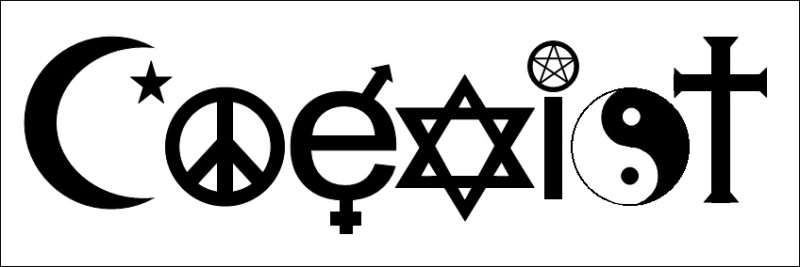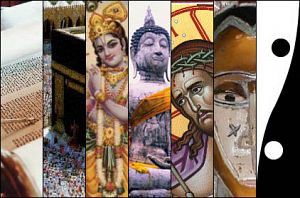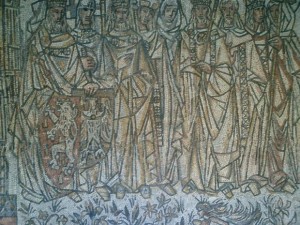 I had never thought of the day of Jesus’ Ascension as a holiday until this year. I’m not all that familiar with Catholic holidays, but I don’t think very many Protestant churches in the United States celebrate the Ascension. Oh, the minister preaches about it. We know it happened between Easter and Pentecost, and we don’t deny its importance, but it just kind of gets lost somehow.
I had never thought of the day of Jesus’ Ascension as a holiday until this year. I’m not all that familiar with Catholic holidays, but I don’t think very many Protestant churches in the United States celebrate the Ascension. Oh, the minister preaches about it. We know it happened between Easter and Pentecost, and we don’t deny its importance, but it just kind of gets lost somehow.
This year, probably because of my Religious Studies courses, I feel the need to spend some time meditating on our Christian rituals and holidays. Several people of my acquaintance have annoyed me with their attitudes about Easter. They have suddenly discovered that most major Christian holidays match up time wise with pagan festivals and also share many rituals. Because of this fact, they think the Christian worship is being degraded. They are re-enforced by the reaction of many conservative Christians who are horrified by this “news.”
Christians who delve more deeply into their faith than childhood Sunday School lessons already know this, have always known this and see it for the irrelevancy that it is. We know that Easter has nothing to do with any pagan god or goddess anymore. The word may have come from there originally, but that “god” died with its last believer.
As pagan people were converted to Christianity, they brought their traditional ways of celebration with them. The people and the new focus of their worship were the important feature, not the origin of the activities. Christians today, know they are not worshiping Ishtar and the timing of Easter is tied to the Jewish Passover season, not some pagan fertility rite.
As I dug into research to prove my thoughts on this, it occurred to me that we seem to be missing a very important day in our holiday lineup. The day that Jesus ascended into heaven should be more important to us. We should be paying more attention to it. What it represents is a major part of our faith. Without his Ascension, our hope of an afterlife would be a very different proposition.
There is no way for us to know for sure, at this point, what the actual date is, but tradition tells us it was 40 days after Resurrection Day. So our Easter season should extend from Ash Wednesday, through the 40 days of Lent, to Easter and then another 40 days to Ascension Day, which is supposed to be on a Thursday. This year that will be May the 29th. Like Easter, it will move every year along with Passover.
During the 40 days between Resurrection and Ascension, Jesus did not go into the city or countryside to make new converts. He spent his time in meetings with his Disciples instructing them on how they were to carry out His teachings. On the 40th day, they watched Him ascend into Heaven. Ten days later the Holy Spirit descended on them at Pentecost.
So, I am making a new commitment. A promise to spend this time studying and meditating on my religion and what it means. I recently bought a book by Bishop Spong titled The Sins of Scripture. It seems like a good place to start. I also have many other religious books that I and my mother before me have collected over the years. I am sure I will have no problem finding material. I’ll keep you posted.
 One of the things I am getting from the classes I’m taking is a wider perspective on religion as a whole. The book we are using for my current class is God is Not One by Stephen Prothero. The text is broken into chapters that each cover a different major religion. Most of them are the mainline organizations we are all familiar with, but it concludes with a strange outlook.
One of the things I am getting from the classes I’m taking is a wider perspective on religion as a whole. The book we are using for my current class is God is Not One by Stephen Prothero. The text is broken into chapters that each cover a different major religion. Most of them are the mainline organizations we are all familiar with, but it concludes with a strange outlook. That “Something” then led me to the Religious Studies program at Western Kentucky University. So, it’s been more than a year now. I feel as though I have barely scratched the surface of what I need to know. Still, Something is telling me it is time to begin. I still feel that it is too personal and I am not qualified to tell anyone else what to think about religion. So, I am trying to figure out where to begin and what direction to go in. It feels like the most dangerous endeavor I have ever embarked upon. I am not ready. I may never be ready.
That “Something” then led me to the Religious Studies program at Western Kentucky University. So, it’s been more than a year now. I feel as though I have barely scratched the surface of what I need to know. Still, Something is telling me it is time to begin. I still feel that it is too personal and I am not qualified to tell anyone else what to think about religion. So, I am trying to figure out where to begin and what direction to go in. It feels like the most dangerous endeavor I have ever embarked upon. I am not ready. I may never be ready. My oldest daughter said to me one day a week or so ago, “You know how you reach a point that you think you are pretty well educated? Then you find out just how ignorant you really are?” We had both suffered that particular realization that day, on different subjects. It is a really stunningly humbling experience. We cruise along, taking classes, reading books, just living. Then we run against something that should really be common knowledge, but we had never been exposed to it.
My oldest daughter said to me one day a week or so ago, “You know how you reach a point that you think you are pretty well educated? Then you find out just how ignorant you really are?” We had both suffered that particular realization that day, on different subjects. It is a really stunningly humbling experience. We cruise along, taking classes, reading books, just living. Then we run against something that should really be common knowledge, but we had never been exposed to it.